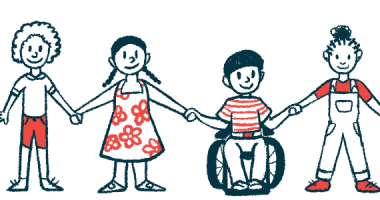The things we don’t talk about as Duchenne caregivers
While it helps to share parts of my journey, some aspects are difficult to divulge
by |

When three of my sons were diagnosed with Duchenne muscular dystrophy more than 10 years ago, I shared everything we experienced on social media and found support and understanding.
But as they grow older, weaker, and more dependent on me, I find caregiving harder than I could’ve imagined. I want others to understand our life with Duchenne, but some things feel too delicate to share.
My thoughts, emotions, and experiences often feel stuck inside, adding to my stress. Many of these experiences have changed me. People have walked out of my life, and others have decided to steer clear.
I understand that, because I’m not the person I was before these three sons — Max, 18, Rowen, 15, and Charlie, 13 — were diagnosed with Duchenne. And I’m not the person I was when they were little, before disease progression affected our lives as it does now.
Those effects have been profound. I’m unsure I remember who I was before Duchenne entered our lives.
I’m thankful that not everyone understands. To truly understand, people would need to have a child or someone else they love who lives with a rare, progressive, and deadly disease. And that loved one would depend on them for support in staying alive and healthy.
Caregiving can be beautiful, and I feel privileged to be that person for my sons, but it’s also complex and heartbreaking, and I wouldn’t choose that for anyone.
The things that have changed me are valid; they’d change anyone. I hope people realize why I’ve changed and that it doesn’t make me a worse person. In fact, I’m more sensitive to the needs of others, have learned to advocate on behalf of others, and now give of myself more completely. I’m a better person because of caregiving.
But I’ve pulled away from people, too. All of my energy goes to one place: my family. And because my family needs more than most, I have very little left over.
Hard truths of my life as a Duchenne caregiver
Here are some truths about my life as a Duchenne caregiver and mother that have changed who I am.
- I’m afraid every day that my sons with Duchenne are going to die.
Unless there’s a cure in their lifetime, Duchenne will almost certainly kill them. It’s logical. And although the three of them are currently in good health, with healthy hearts and lungs, sometimes when they sleep late and I go in to wake them up, I’m afraid I’m going to find them lifeless. I’m scared to push open the door sometimes.
- I don’t like to drive past the cemetery.
A large and beautiful cemetery is about a mile from our home. I live in my hometown and have for almost my entire life. As a child, I sometimes rode my bike through the graveyard. As a young woman, I sometimes ran through it, training for races.
But now, I realize that I could bury Max, Rowen, and Charlie there if I outlive them, as it seems I likely will. I hate to drive by it. No matter how great my day is going or how happily I’m chatting with my children sitting in the back seats, there’s an awareness of where I am and what it means.
- I find it hard to shower my teenage sons with Duchenne.
I once had a conversation with someone not familiar with Duchenne caregiving, in which I mentioned how time-consuming and difficult it is to shower my son. It was obvious that until I mentioned bathing them, my conversation partner had never considered it, saying, “Yeah, I guess they can’t take their power chairs into the shower.”
At diagnosis, a doctor told me that someday my sons would need help with all their activities of daily living. I knew that meant showering, but I was unprepared for the transfers, shampooing, and washing.
I hate it for them. I find myself apologizing for being the one who has to help because who wants their mom to see them naked? I have one son who does not have Duchenne. He’d be horrified to have me help him shower. And yet Duchenne shoves a dose of humility down my other sons’ throats every time I have to help them that way.
There’s no way to live with Duchenne — as your diagnosis, as a caregiver, or as a family member — and not be changed. There are many wonderful ways this rare disease has altered our lives that are easy to discuss. But there are also some dark and scary things that are easy to hide. I wanted to talk about some of the hard stuff here because it’s part of my journey, too.
Note: Muscular Dystrophy News Today is strictly a news and information website about the disease. It does not provide medical advice, diagnosis, or treatment. This content is not intended to be a substitute for professional medical advice, diagnosis, or treatment. Always seek the advice of your physician or another qualified health provider with any questions you may have regarding a medical condition. Never disregard professional medical advice or delay in seeking it because of something you have read on this website. The opinions expressed in this column are not those of Muscular Dystrophy News Today or its parent company, Bionews, and are intended to spark discussion about issues pertaining to muscular dystrophy.









Comments
Katherine Feeny
I had a brother named Tad .. who lost his fight to MD .. at age 25 in 1976 .. a doesn’t go by that I don’t think about him and the learnings I received from him . My Mom was his caregiver and I relate to everything that you said .. though not a Mom but from a sibling point of view I tried to avoid the fact that Tad’s life would be shorten . Today I live for the moment and try not wm to waste peoples time .. bc every second counts . I wish my mom was still with ius so you could chat with her . Jerry Lewis is my hero !! A big hug .. most people will not have the quality time that you are spending with your three sons .. embrace it !!! Tad and I never stop believing of a cure ! 🥰
Barbara Mulholland
I enjoy your articles. I do hope you have SOME assistance with your sons. Our oldest son has Duchene, 37 yrs old. We have twins who are 35 yrs old and healthy and married on their own. I pray that there will be a cure for your sons and mine! Right now I am a caregiver for my husband also, ALS!! Kevin's doctors have never heard of both disease in one family where there isn't a carrier. Even though I do have assistance with my husband I am a single mom caring for 2 adults with terminal disease. Like you I do think of the day I will lose them both and i am afraid.
Thank you for your insights. God Bless You
Robin M Taylor
Again, Betty has written what so many caregivers feel everyday. She has a way of telling it like it is -- the good, the bad, the easy, the hard. She also continues to give us hope that we can manage this disease. Betty, thank you for sharing yourself and family with us.
Janine Ramseur
My grandson has Duchenne Muscular Dystrophy. He is now 25 years old. He is smart and delightful to be around. He can move his hands to control his power chair and use his computer if my daughter helps him to put his hands on the keyboard. My daughter is his caretaker. She, like you, has changed. I feel sure she has the same fears Betty Vertin expressed as there is no cure. I think that there should be more help for her and for my daughter. As a matter of mental health, parents need help. I have tried to help, but my daughter has not been receptive. Maybe some MDA specialists can develop a solution for giving care to caregivers.
marco
Thanks for sharing! that's exactly how I feel